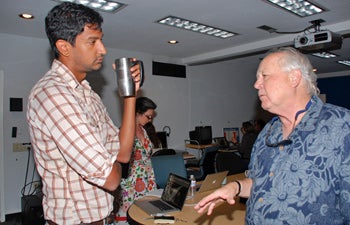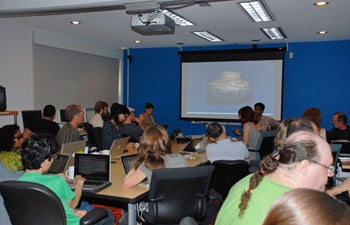Race and Cyberspace
The screen image showed a sÄÂdhu — or wandering monk — in India using a large mobile phone, and a fisherman who lives in a hut on a beach near Nagapattinam, India, talking on his cell.
Once found only in niche publications like Wired, these kinds of photographs are now seen in the pages of Time.
“It doesn’t surprise us anymore,” said Ramesh Srinivasan, assistant professor of information studies at UCLA. “The technology that’s readily and actively used most around the world is definitely the mobile phone.”
Srinivasan spoke during the Summer Institute on Digital Approaches to American Studies and Ethnicity that started July 18 and ends August 12. The institute was organized by USC Dornsife’s Department of American Studies and Ethnicity (ASE), USC’s Institute of Multimedia Literacy (IML) and USC’s Center for Transformative Scholarship.
He shared with scholars his work with bloggers who have overthrown the recent authoritarian Kyrgyz regime, and his research studying how technology can bolster literacy among non-literate tribes in India. Just returning from Egypt, he demystified some of the narrative surrounding the uprising in Cairo, Alexandria and other areas that began January 11.
The summer institute merged digital humanities with American and ethnic studies. The 15 fellows’ projects were not all about new media, but they all utilized multimedia to re-imagine scholarship in a digital format. Some are working on multimedia portions of their dissertations or digital versions of their books.
ASE Chair John Carlos Rowe, USC Associates Chair in Humanities, and professor of English and ASE, called the endeavor an important step.
“American studies and ethnicity has been a progressive field, yet has been technologically behind,” Rowe said. “So we’re bringing it up to date in terms of the ways in which it does its research and the ways in which it disseminates its research to others in the field.”

ASE Chair John Carlos Rowe, USC Associates Chair in Humanities, and professor of English and ASE (right), chats with speaker Srinivasan during the summer institute.
This is the third National Endowment for the Humanities-funded summer institute IML and the team from the journal, Vectors, has held, but the first focusing on one field.
“We decided that focusing on a field as imaginative as ASE would really let us get at the questions scholars in one discipline would want to ask,” said Tara McPherson, who holds a joint appointment as associate professor of gender studies in USC Dornsife and critical studies in the USC School of Cinematic Arts. “Fellows are discovering how certain technology platforms might best enable them to ask new questions and do exciting new kinds of research.”
During Srinivasan’s presentation, he described to fellows what he witnessed on the frontlines during the January riots in Egypt. His boots-on-the-ground research showed that the protests were not generated or facilitated by Facebook or social media, as has been widely reported.
“What percentage of people in these protests do you think are active Twitter users or bloggers?” Srinivasan asked. “Almost none.”
Of Egypt’s 85 million people, 15 percent have Internet access and less than 5 percent have Facebook or Twitter accounts, he said.
“There’s no question that social media is used to spread awareness but the real question is what gets people out on the streets,” he said. Protest organizers summoned people coming out of mosques who then took to the streets. They packed the small alleys, confusing police and giving a perception of more people crowding the streets.
Rather, social media greatly influences local television and newspaper networks, Srinivasan said, whose journalists often base reports on messages from the small population using Twitter.

Of 100 international applicants, 15 were chosen, and some are affiliated with USC Dornsife. Here, they listen to Srinivasan’s presentation.
In addition to the guest lectures, fellows have access to IML’s state-of-the-art production facilities and are working with world-class designers to complete drafts of their multimedia projects. They are also holding workshops where they collectively address scholarly multimedia, and American and ethnic studies. The sessions are led by various scholars including Rowe, McPherson and Philip Ethington, professor of history in USC Dornsife and a key figure in HyperCities, a digital educational platform for exploring the layered histories of cities.
Of 100 applicants worldwide, 15 were chosen, a few from England and Canada. Some fellows are affiliated with USC, for example Wendy Cheng, Kara Keeling and Thenmozhi Soundararajan. Cheng earned her Ph.D. in ASE from USC Dornsife in 2009 and is now assistant professor of Asian Pacific American studies, and justice and social inquiry at Arizona State University.
Cheng is creating a multimedia project based on A People’s Guide to Los Angeles, a book she co-authored with Laura Pulido, professor of ASE, and Laura Barraclough, who earned her Ph.D. in ASE from USC Dornsife in 2006 and is now assistant professor of sociology at Kalamazoo College.
A People’s Guide due out from University of California Press in Spring 2012, is an alternative tour guide documenting more than 100 sites of oppression, resistance and struggle within Los Angeles County’s everyday landscapes.
Keeling, associate professor of ASE in USC Dornsife, and critical studies in the USC School of Cinematic Arts, is collaborating on a multimedia project with USC School of Cinematic Arts graduate student Soundararajan.
Their project uses the work of Third World Majority, a women of color media justice organization, as a case study to address the relationships between digital media makers and current movements for social and economic justice.
“Given the significance of digital technologies today, I think that, at its best, the digital humanities has the potential to help us to understand, engage with or innovate within several of the transformative forces currently shaping us,” Keeling said at the summer institute held at IML.
“Insofar as scholarship needs an audience,” she added, “working to develop ways to produce and deliver rigorous, serious and substantive humanities-based scholarship using digital technologies is an imperative for today’s intellectuals.”